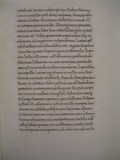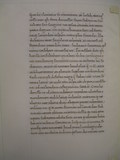Ohio State University Leaf 39
This leaf comes from a rare manuscript of Livy's History of Rome (completed in about 9 A.D.) copied in Italy in the middle of the fifteenth century. It measures 22.5 x 16 cm and its vellum is very well prepared, though some rubbing of the ink has cast a shadow over the text block of some pages. The Humanistic script is crisp, clear, and without adornment; an exception is the Denison leaf, with its striking initial "H." See Denison University Leaf 39 for more information about this manuscript.
Text: This leaf contains the text of Livy's History, Book 28, Chapters 25-26. The English translation is that of Cyrus Edmonds (1850), via Project Gutenberg.
 Ohio State University Leaf 39 Recto
Ohio State University Leaf 39 Recto
Ohio State University Leaf 39 Recto
 Ohio State University Leaf 39 Recto Transcription
Ohio State University Leaf 39 Recto Transcription
iactabatur, et cum eodem tempore quo scelus Iliturgitanum exstitisset post duorum imperatorum duorumque exercituum stragem sua virtute defensum nomen Romanum ac retenta provincia esset, Iliturgitanos poenam noxae meritam habere, suis recte factis gratiam qui exsolvat non esse. talia querentes aequa orare seque ea relaturos ad imperatorem respondebant; laetari quod nihil tristius nec insanabilius esset; et P. Scipionem deum benignitate et rem publicam esse gratiae referendae. Scipionem, bellis adsuetum, ad seditionum procellas rudem, sollicitum habebat res ne aut exercitus peccando aut ipse puniendo modum excederet. in praesentia, ut coepisset, leniter agi placuit et missis circa stipendiarias civitates exactoribus stipendii spem propinquam facere; et edictum subinde propositum ut ad stipendium petendum convenirent Carthaginem, seu carptim partes seu universi mallent. tranquillam seditionem iam per se languescentem repentina quies rebellantium Hispanorum fecit; redierant enim in fines omisso incepto Mandonius et Indibilis, postquam vivere Scipionem allatum est; nec iam erat aut civis aut externus cum quo furorem suum consociarent. omnia circumspectantes nihil reliqui habebant praeter unum tutissimum a malis consiliis receptum, ut imperatoris vel iustae irae vel non de-
 Ohio State University Leaf 39 Recto Translation
Ohio State University Leaf 39 Recto Translation
...complained; and "that although at the time of the horrid transaction of the Illiturgians, and after the destruction of two generals and two armies, the Roman cause had been defended and the province retained by their valour; the Illiturgians had received the punishment due to their offence, but there was no one found to reward them for their meritorious services." The tribunes replied, "that, considering the nature of their complaints, what they requested was just, and that they would lay it before the general; that they were happy that there was nothing of a more gloomy and irremediable character; that both Publius Scipio, by the favour of the gods, and the commonwealth, were in a situation to requite them." Scipio, who was accustomed to war but inexperienced in the storms of sedition, felt great anxiety on the occasion, lest the army should run into excess in transgressing, or himself in punishing. For the present he resolved to persist in the lenient line of conduct with which he had begun, and sending collectors round to the tributary states, to give the soldiers hopes of soon receiving their pay. Immediately after this a proclamation was issued that they should come to Carthage to receive their pay, whether they wished to do so in detached parties or all in a body. The sudden suppression of the rebellion among the Spaniards had the effect of tranquillizing the mutiny, which was by this time beginning to subside of itself; for Mandonius and Indibilis, relinquishing their attempt, had returned within their borders when intelligence was brought that Scipio was alive; nor did there now remain any person, whether countryman or foreigner, whom they could make their companion in their desperate enterprise. On examining every method, they had no alternative except that which afforded a retreat from wicked designs, which was not of the safest kind, namely, to commit themselves either to the just anger of the general...
 Ohio State University Leaf 39 Verso
Ohio State University Leaf 39 Verso
Ohio State University Leaf 39 Verso
 Ohio State University Leaf 39 Verso Transcription
Ohio State University Leaf 39 Verso Transcription
-sperandae clementiae sese committerent: etiam hostibus eum ignovisse cum quibus ferro dimicasset: suam seditionem sine volnere, sine sanguine fuisse nec ipsam atrocem nec atroci poena dignam -- ut ingenia humana sunt ad suam cuique levandam culpam nimio plus facunda. illa dubitatio erat singulaene cohortes an universi ad stipendium petendum irent. inclinavit sententia, quod tutius censebant, universos ire. [26.] Per eosdem dies quibus haec illi consultabant consilium de iis Carthagini erat, certabaturque sententiis utrum in auctores tantum seditionis -- erant autem ii numero haud plus quam quinque et triginta -- animadverteretur, an plurium supplicio vindicanda tam foedi exempli defectio magis quam seditio esset. vicit sententia lenior ut unde culpa orta esset ibi poena consisteret: ad multitudinem castigationem satis esse. consilio dimisso, ut id actum videretur, expeditio adversus Mandonium Indibilemque edicitur exercitui qui Carthagine erat et cibaria dierum aliquot parare iubentur. tribunis septem qui et antea Sucronem ad leniendam seditionem ierant obviam exercitui missis quina nomina principum seditionis edita sunt, ut eos per idoneos homines benigno voltu ac sermone in hospitium invitatos sopitosque vino vincirent. haud procul iam Carthagine aberant cum ex obviis auditum postero die omnem exer-
 Ohio State University Leaf 39 Verso Translation
Ohio State University Leaf 39 Verso Translation
...or to his clemency, of which they need not despair. For he had pardoned even enemies whom he had encountered with the sword; while they reflected that their sedition had been unaccompanied with wounds or blood, and was neither in itself of an atrocious character nor merited severe punishment. So natural is it for men to be over-eloquent in extenuating their own demerit. They felt doubtful whether they should go to demand their pay in single cohorts or in one entire body; but the opinion that they should go in a body, which they regarded as the safer mode, prevailed. [26] At the same time, when they were employed in these deliberations, a council was held on their case at Carthage; when a warm debate took place as to whether they should visit with punishment the originators only of the mutiny, who were in number not more than thirty-five, or, whether atonement should be made for this defection, (for such it was rather than a mutiny,) of so dreadful a character as a precedent, by the punishment of a greater number. The opinion recommending the more lenient course, that the punishment should fall where the guilt originated, was adopted. For the multitude a reprimand was considered sufficient. On the breaking up of the council, orders were given to the army, which was in Carthage, to prepare for an expedition against Mandonius and Indibilis, and to get ready provisions for several days, in order that they might appear to have been deliberating about this. The seven tribunes who had before gone to Sucro to quell the mutiny, having been sent out to meet the army, gave in, each of them, five names of persons principally concerned in the affair, in order that proper persons might be employed to invite them to their homes, with smiles and kind words; and that, when overpowered with wine, they might be thrown into chains. They were not far distant from Carthage when the intelligence, received from persons on the road, that the whole army was going the following day...